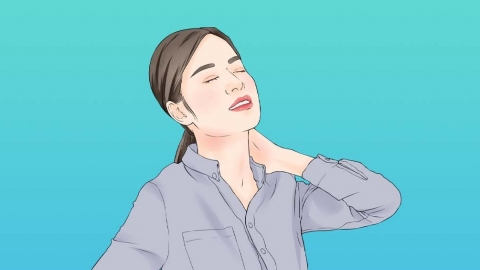What causes the feeling of neck swelling when bending my head down?
Generally, a sensation of neck swelling when lowering the head may be caused by factors such as neck muscle tension, poor posture, cervical lymphadenitis, thyroiditis, or cervical spondylosis. It is recommended to seek medical attention promptly, identify the underlying cause, and receive symptomatic treatment under a doctor's guidance. Specific analyses are as follows:

1. Neck muscle tension: Prolonged desk work or looking down at electronic devices can cause continuous contraction of neck muscles. When the head is lowered, the muscle pull becomes more pronounced, leading to a feeling of swelling. To alleviate this, reduce the duration of looking down—take a 5-minute break to lift your head and move every 30 minutes. Gentle neck massage and performing "rice-character" cervical exercises can help relieve muscle tension and reduce the sensation of swelling.
2. Poor posture: Long-term slouching or using a pillow of inappropriate height can alter the natural curvature of the cervical spine. When the head is lowered, uneven stress on neck tissues can trigger a swollen sensation. Adjust daily posture by keeping the back straight, choosing a pillow with suitable height, and avoiding sleeping face down to reduce pressure on neck tissues.
3. Cervical lymphadenitis: Inflammation caused by bacterial or viral infection can lead to enlarged cervical lymph nodes. When the head is lowered, skin traction in the neck area may intensify the feeling of swelling, possibly accompanied by local tenderness. Patients may follow medical advice to use medications such as amoxicillin capsules, cefuroxime axetil tablets, or ribavirin granules to control infection and reduce inflammation.
4. Thyroiditis: Autoimmune abnormalities or infections may trigger thyroid inflammation, causing thyroid enlargement. When the head is lowered, the enlarged thyroid compresses surrounding tissues, resulting in a sensation of swelling, possibly accompanied by neck pain and fatigue. Patients may follow medical advice to take medications such as levothyroxine sodium tablets, methimazole tablets, or prednisone tablets to regulate thyroid function and reduce inflammatory response.
5. Cervical spondylosis: Degenerative changes in the cervical spine can lead to disc herniation and bone spurs. When the head is lowered, protruding tissues may compress nerves and blood vessels, causing a sensation of neck swelling, possibly accompanied by numbness in the upper limbs or dizziness. Patients may follow medical advice to use ibuprofen sustained-release capsules, mecobalamin tablets, or eperisone hydrochloride tablets to relieve pain and support nerve health.
Daily care should include keeping the neck warm and avoiding direct exposure to cold air; performing appropriate neck stretching exercises, such as tilting the head back in circular motions or lateral neck bending; and consuming foods rich in calcium and vitamin D—such as milk, soy products, and leafy green vegetables—to support cervical spine health.









